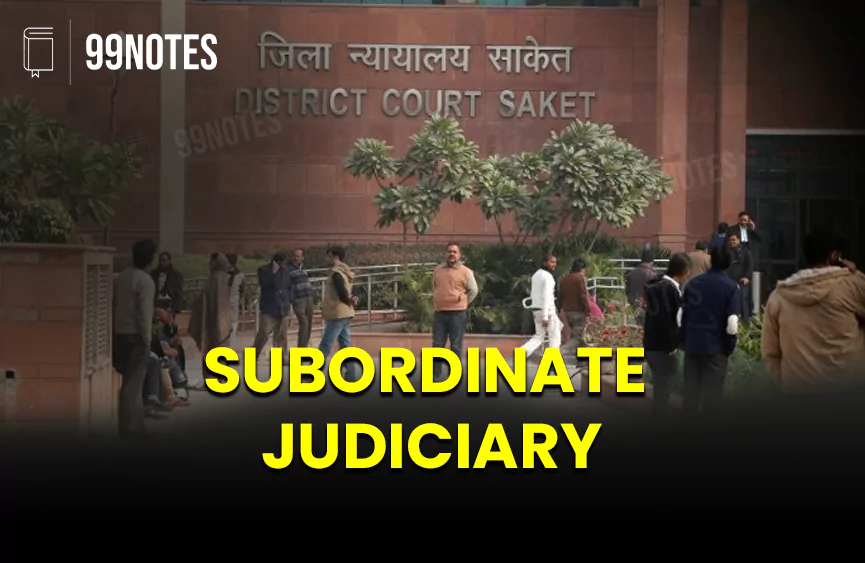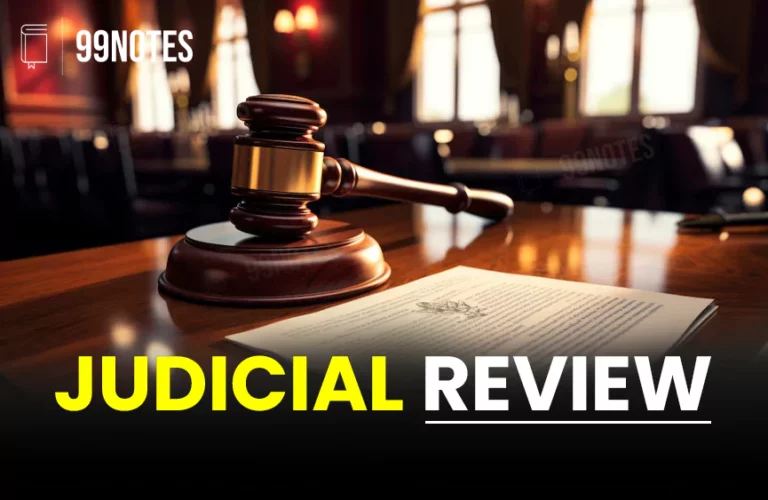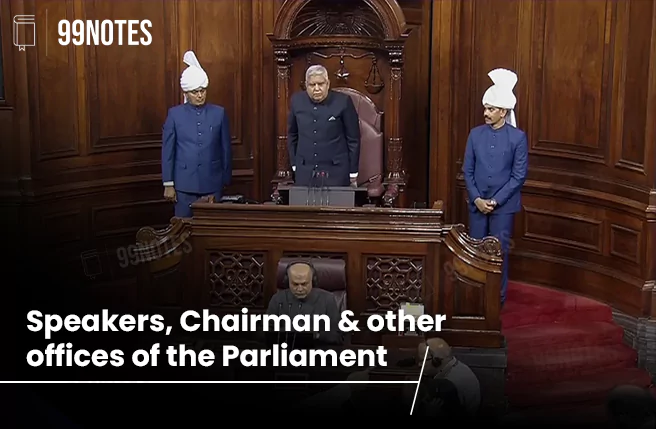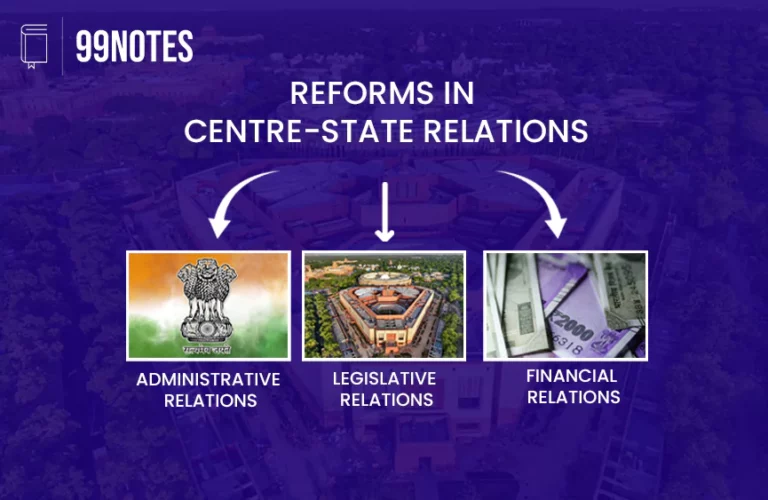Subordinate Judiciary
Subordinate Courts consist of district courts and other lower courts. They are called subordinate courts as they are subordinate to the High Courts. Subordinate Judiciary is the backbone of the Judiciary. It is the first judicial institution with which a majority of the citizens interact. It is covered under Part IV of the Indian constitution from Article 233 to 237.
In each District of India, there are different types of subordinate courts. They are criminal courts, civil courts and revenue courts. These Courts hear civil cases, criminal cases and revenue cases, respectively.
Structure of the Subordinate Court
The structure of the subordinate courts differs from State to State. There are generally three tiers of civil court and criminal courts below the high court. The district court is the highest court in the District.
On the civil side (in ascending order of hierarchy) are:
- Junior Civil Judge Courts
- Principal Junior Civil Judge Courts
- Senior Civil Judge Courts (also called sub-court).
Subordinate courts on the criminal side (in ascending order of hierarchy) are:
- First Class Judicial Magistrate Court and;
- Chief Judicial Magistrate Court.
Appointment procedure:
Appointment of the District Judge:
- Article 233 states that the Governor of the State, in consultation with the High Court of that State, will decide upon the appointment, posting, and promotion of the district judges in that State.
- The Supreme Court of India, in its judgement in the All India Judges Association vs. Union of India case, laid down three methods of appointment of District Judges. The methods are the following:
- Direct recruitment from advocates at the Bar with a minimum experience of 7 years or;
- Promotion based on merit;
- Merit-cum-seniority from the pool of existing Civil Judges (Senior Division).
- In case of promotion, the Governor decides with the consultation of the High Court in that State. In the matter of recruitment from the Bar, the appointment can be made on the recommendation of the High Court. Thus, the High Court has been made powerful in the recruitment of district judges.
- Article 236 clarifies the term District Judge, which includes Judge of a sessions judge, additional sessions judge, city civil court, additional district judge, joint district judge, assistant district judge, chief presidency magistrate and assistant sessions Judge.
Appointment of judges other than the district judge:
Article 234 talks about judges other than district judges. According to it, the appointment of these judges shall be made by the Governor of the State in accordance with the rule he made in consultation with the State Public Service Commission.
Jurisdiction of the Subordinate Court:
Original jurisdiction of the District Court:
- The District Court exercises jurisdiction on the original side in civil as well as criminal matters arising in the District.
- When a district Judge hears cases regarding criminal cases, he is known as a session Judge, whereas when it deals with civil cases, he is known as the district judge.
- The territorial and pecuniary jurisdiction( jurisdiction of a court over a suit based on the amount of its subject matter) in civil matters is usually set in concerned State acts on the subject of civil courts.
- On the other hand, jurisdiction on the criminal side is exclusively derived from the Criminal Procedure Code (CrPC). As per CrPC, a Sessions Judge of the district court may award a maximum sentence of capital punishment to a convict. However, capital punishment has to be confirmed by the High Court of that State.
- Certain matters on the civil side or criminal side can be tried by a district court only. This provides the District Court with original jurisdiction in such cases.
Appellate jurisdiction of the District Court:
The district court, as the highest court in the District, has appellate jurisdiction over all subordinate courts situated in the District in both civil and criminal matters. Appeal against his order and judgments lies in the high courts.
Supervisory power of the District Court:
Being the highest court in the District, the District & Sessions Judge has supervisory and administrative control over all the Judges/Judicial Magistrates, including decisions on the allocation of work among them. Being the highest Judge at the district level, the District and sessions Judge also has the power to manage the state funds allocated for the development of the Judiciary in the District.
Control over Subordinate Courts:
As per Article 235, The High Court exercises control over the District Courts and other courts subordinate to them in matters such as posting, promotions and granting of leave to all persons belonging to the State judicial service
Issues in the subordinate Judiciary:
Pendency of cases: Out of the total 4.7 crore cases pending in courts across different levels of the Judiciary, 87.4% are pending in subordinate courts. It reflects the overburdened lower Judiciary and delays in justice delivery.
Vacancies in the subordinate Judiciary:
- Vacancies in the lower Judiciary are often neglected, which affects justice delivery. Vacancies in the lower Judiciary are the consequence of unclear recruitment procedures, erratic and long recruitment cycles, irregular conduct of examinations, and lack of coordination between the High Courts and the respective state governments, which have affected the selection process. This has resulted in understaffed courts and lower court judges often overburdened with matters.
- Even after a complete recruitment cycle of the lower Judiciary, it is unable to fill the vacancies as lawyers are discouraged from applying due to poor working conditions in the lower Judiciary. This reflects the structural problem in the lower Judiciary.
Inadequate secretarial and support staff:
- There are vacancies of 41775 positions for secretarial and support staff, which has resulted in problems with the scheduling of cases, unsound manner of listing of cases, etc.
Issue of the infrastructure:
- Responsibility to develop court systems is shared between states and the Union. While court infrastructure has an impact on access to justice, it is noteworthy that most states, with the exception of Maharashtra, spend less than 2% of their budget on the Judiciary. Further, there is acute underutilization of funds already earmarked for the Judiciary. For example, the subordinate Judiciary is operating under a deficiency of 5,018 courtrooms.
Judicial Education, Training and Legal Awareness: Lower court judges lack appropriate knowledge of emerging and more specialized areas of law. This results in a delay in the proceedings as the Judge is unable to lead the proceedings in an effective manner. Sometimes, they even face problems when a newly appointed judge faces a senior lawyer.
Judicial inefficiencies: Judicial inefficiencies include the absence of a Judge, overcrowding in the listing of cases, paucity of time to hear matters, absence of counsel, unnecessary adjournment, etc, that hampers access to justice.
Performance review of lower Judiciary:
High Courts exercise supervisory control over subordinate courts that include evaluation of the judicial performance of subordinate court judges. The performance review is conducted through a system of Annual Confidential Reports (“ACRs”), which are done by the senior-most judges of the lower court and then reviewed by the state High Court. However, the ARCs are not filled up regularly and are conducted in a non-transparent manner.
Reform needed in the lower Judiciary:
- Filling judicial vacancies: There is a need to reform the judicial recruitment process so that regular exams are conducted within a short cycle.
- Expansion of the judicial strength: An increase in the sanctioned strength in the subordinate courts helps increase the efficiency of the subordinate Judiciary. It will decrease the pendency of cases.
- Judicial case management: Use of technology in case management, digitization of records for record-keeping, etc., will help increase the efficiency of the justice delivery.
- Improvement in infrastructure: Physical infrastructure like courtrooms, toilets in the Court Premises, etc., should be maintained. It will also motivate the new talents of law School to join the Subordinate Judiciary.
- Better and updated judicial training: Better training of the judges with specialized domain of legal education.
- Regular review of the subordinate Judiciary: There is a need for regular review of the working of the Judiciary to increase the accountability of the subordinate Judiciary. It can be done by regularly filing the Annual Confidential Reports (“ACRs”) in a transparent manner.
Though the Subordinate Court is in the lowest rung of the judicial hierarchal setup, it is nonetheless very important to deliver justice very effectively as it deals with the people directly. Thus, it is necessary to take effective steps to reform the subordinate Judiciary so that people’s trust in the sacred institution is maintained.






![National Human Rights Commission (Nhrc) [Upsc Notes] | Updated February 21, 2026 National Human Rights Commission (Nhrc) [Upsc Notes]](https://99notes.in/wp-content/uploads/2024/01/national-human-rights-commision-featured-667168d64d9c6-768x500.webp)